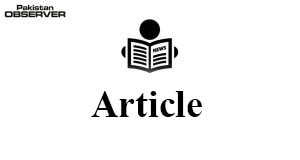Taliban: From government to governance
TIME flies but certain geopolitical realities never change as if they are universal truths or as Ameri cans like to call the Manifest Destiny.
Taliban were the dominant politico-military power when the United States attacked Afghanistan precisely two decades ago to dislodge them.
As Americans depart, the Taliban are still the dominant politico-military power whom all regional and international powers having a stake in this region want to be friends with.
For various geopolitical and social reasons, Pakistan remains the most important foreign player in Afghanistan as our fate is intertwined with that country.
Transition management:
Most important is what all stakeholders have learned over a fairly long and painful period of time and how it would manifest in their future course of action.
Above all, the Taliban, being the single most dominant political stakeholder, need to demonstrate that they are not just mighty warlords but also have a comprehensive administrative plan for post-American Afghanistan.
The Taliban will need to demonstrate that they are ready to transform their control of territory into a comprehensive governance structure with a long-term sustainable socio-economic development plan for the Afghan people who have suffered terribly for the past many decades.
While there is plenty of talk in the international media on geopolitical aspects of post-American Afghanistan, there is a little global appetite to reflect on how Afghanistan can be a peaceful and developed member of the international community.
In all likelihood, this responsibility of creating a socio-economic development framework for Afghan people is most likely to fall on the shoulders of the Taliban and neighboring Pakistan. For that purpose, some of the following need to be done by Pakistan on an urgent basis.
Socio-economic development framework:
First, a strategic framework needs to be designed which identifies key areas of governance, their legal structure, availability of human resources keeping in view the current state of development in each district of Afghanistan.
This includes food security, education, health, financial services, telecom, technology, etc. A comprehensive benchmarking and gap analysis would allow the identification of major shortfalls and to gauge the depth of the problems at hand.
In this regard, some of the research undertaken by international institutions, like UNICEF, could be useful to understand the fundamental issues that need to be addressed.
Human resource development:
Another important aspect is human resource development i.e. to mobilize and develop a team of professionals who can manage the above important tasks. Pakistan should take the lead to train the next generation of Afghan leadership.
Although critics may argue that our own state of human development is not in great shape; but we do have a large number of quality institutions that can deliver upon this important task effectively.
The recently-launched Allama Muhammad Iqbal Scholarships For Afghan National Students need to be combined with the governance framework which Afghanistan would need in the short term.
There would be a significant skill vacuum in Afghanistan that needs to be filled with quality human resources.
Domestic NGO network:
Pakistan should leverage the large network of NGOs domestically active in education, healthcare, and poverty alleviation. The PTI government is already leveraging these NGOs in food, microfinance, etc.,
quite effectively within the country. Pakistan can always use the expertise and delivery mechanism of these NGOs in Afghanistan through “Controlled Aid Corridors”.
To some extent, we can learn from Turkey in creating aid corridors in northern Syria to stem the flow of refugees from war-ravaged Syria into Turkey.
Multi-stakeholder group:
It is important to keep these efforts transparent and multi-stakeholder driven to make them sustainable.
Pakistan can lead the creation of an informal group called “Friends of Afghan People’s Development” which includes like-minded countries that can contribute towards these developmental efforts.
While it may cause some control issues, it will bring significant depth, diversity, and durability to the overall mission.
Pakistan can play a very important role in the multi-stakeholder-driven future economic development of Afghanistan.
Journey just begins: Taliban are currently on a “journey from de facto to de jure”. History teaches us that it is always a painful task. However, these pains can be made more tolerable and outcomes are more effective if socio-economic development becomes the top priority.
Indians have been actively promoting their soft power in Afghanistan mainly through sports and culture-related initiatives.
While Pakistan has launched some sporadic initiatives to build the knowledge capital of Afghanistan, it is time that we put in place a comprehensive socio-economic development framework that can facilitate any incoming government (read Taliban) towards the accelerated realization of these objectives. We can’t afford to leave any vacuum unfulfilled.
As Aristotle put it “nature abhors a vacuum”. Let’s add to it that “nature also abhors those who don’t fulfill the vacuum despite having the opportunity”.
—The writer is the CEO of WIXEMAN GLOBAL, a strategy consulting firm practicing in GCC and Pakistan.
He is a Fellow Chartered Management Accountant from the UK, Fellow Chartered Accountant from Pakistan, a Chartered Islamic Finance Professional from Malaysia, and Masters’s in Economics from Karachi University.








